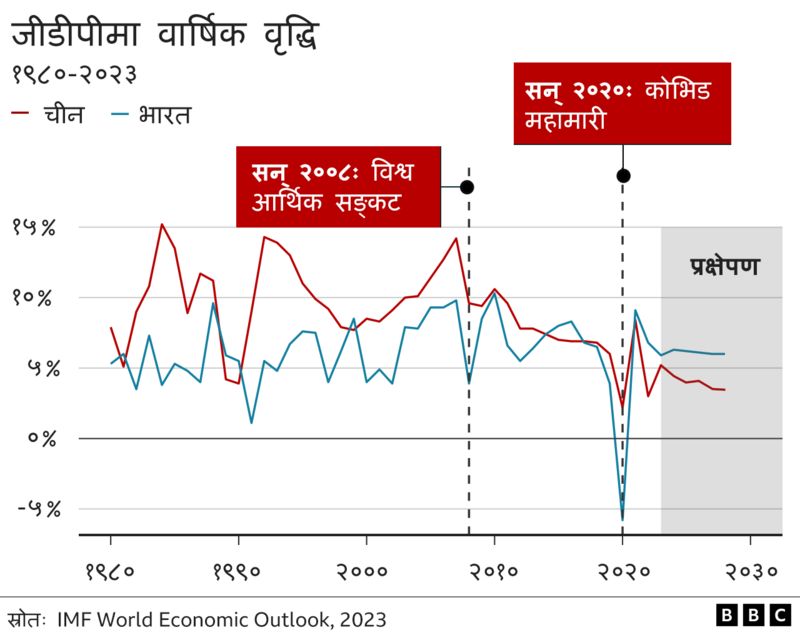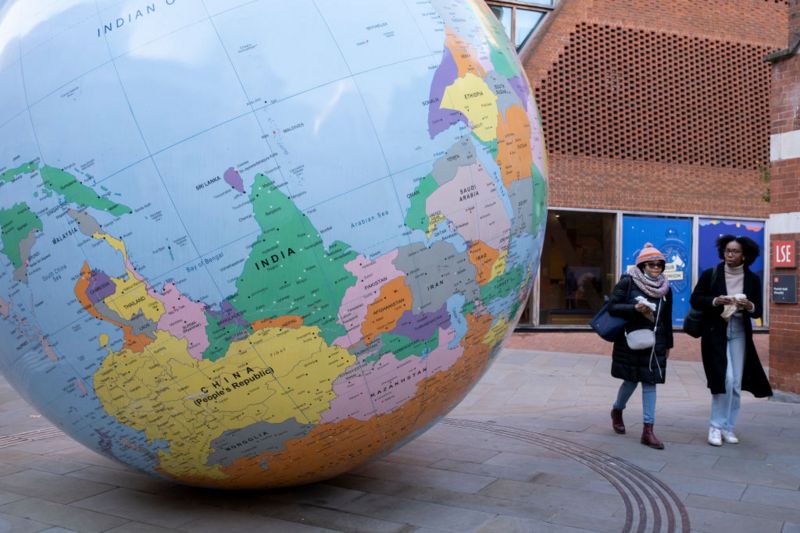The United Nations reports that India has surpassed China to become the world's most populous country.
Can India grow as powerful as its neighbor, or even conquer it?
Beijing continues to lead in terms of economy, geopolitical influence, and military force. However, analysts believe that the situation is changing.
Michael Spence, who received the Nobel Peace Prize in Economics in 2001, stated that India's "time has come."
"India will win over China," said Spence, dean and professor at Stanford University, to the BBC. "While China's economic growth will slow, India's will not."
However, there will be difficulties ahead.
Should India be surprised or concerned about its position as the world's most populated country?
Why is there concern about the UK, China, and the world order being threatened by increased investment?
China's economy is the world's second largest. That is five times the size of India's economy. India is the world's fifth largest economy.
To attain "Chinese-style" growth, India, with a relatively small middle class, must invest in education, living standards, gender equality, and economic reforms.
And being a world power requires moving beyond population and economy.
The ability to become a world power is dependent on geopolitical and military power, both of which India falls significantly behind China.
Soft power is also very significant. The Bollywood film industry is efficiently marketing India on a global scale and breaking records on Netflix.
However, the influence of 'Chinawood' is also obvious. For the first time, the fast expanding Chinese film industry overtook Hollywood.
The economic momentum in India
Every day, 86,000 kids are born in India and 49,400 in China.
Due to low birth rates, China's population is predicted to decline from one billion by the end of this century.
According to the United Nations, India's population will continue to expand until 2064, rising from 1.4 billion to 1.7 billion.
This will result in a "demographic dividend" for India. This word is used to describe economic growth as the working population grows.
 |
"India's reform policies of the 1990s are now bearing fruit." "How educated, healthy, skilled, and skilled the workforce is will matter," says Mark Fraser, head of the India China Institute in New York.
Despite enticing multinational corporations such as Apple and Foxconn, the volatility produced by continuous changes in India's government mechanism and policies has alarmed some overseas investors.
China and the United States are involved in a verbal battle over South America's lithium reserves.
1. Bhutan supports a border agreement with China: Will it be accepted in India?
2. How prepared is the Indian Air Force to deal with the Chinese threat?
"The more powerful you are in the 19th century, the more powerful you are," fraser remarked, adding that additional things are required to determine dominance.
According to the World Bank, only half of India's working-class population (14-64) is employed or actively seeking employment.
Women make up only 25% of the population in India, compared to 60% in China and 52% in the European Union.
China's economy developed faster than any other country in the 1980s and 1990s.
However, its economic progress has been hampered by the Covid epidemic, an aging population, and increased conflicts with Western countries.
According to IMF predictions, India's GDP is increasing rapidly and will most certainly continue to do so.
But does slowing economic growth imply that China is no longer relevant?
For the first time, China's birth rate falls.
1.Why do many people mistrust the census statistics, which reveal a population of 2.2 million Nepalis living abroad?
In 2100, the Earth's population will be 'amazingly' reduced.
"It would be an impressive achievement if China achieved 4% or 5% growth by 2030." People may believe that a country with an annual growth rate of 8-9% has experienced a severe slump, but this is not the case, according to Professor Spence.
"China is very similar to the United States." We have yet to see economic growth of 8, 9, 10%. They will rely on increased productivity and, in my judgment, will achieve this through large investments in education, science, and technology."
If you have any problem regarding this comment us, we will help you, if you like this post share it with your friends.
Visit our website to get more information about the different topic:





0 Comments